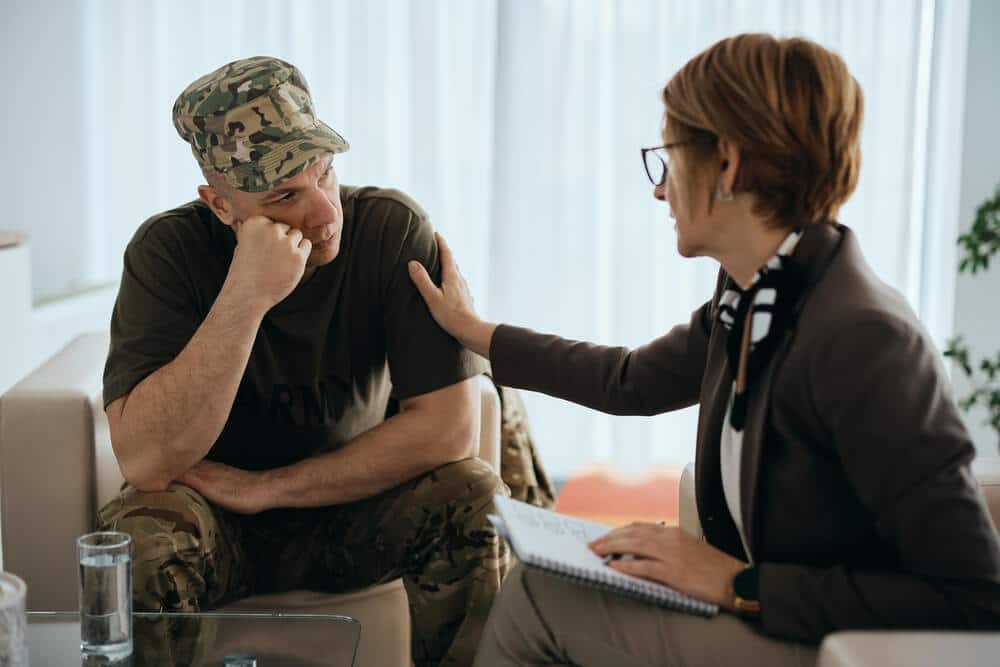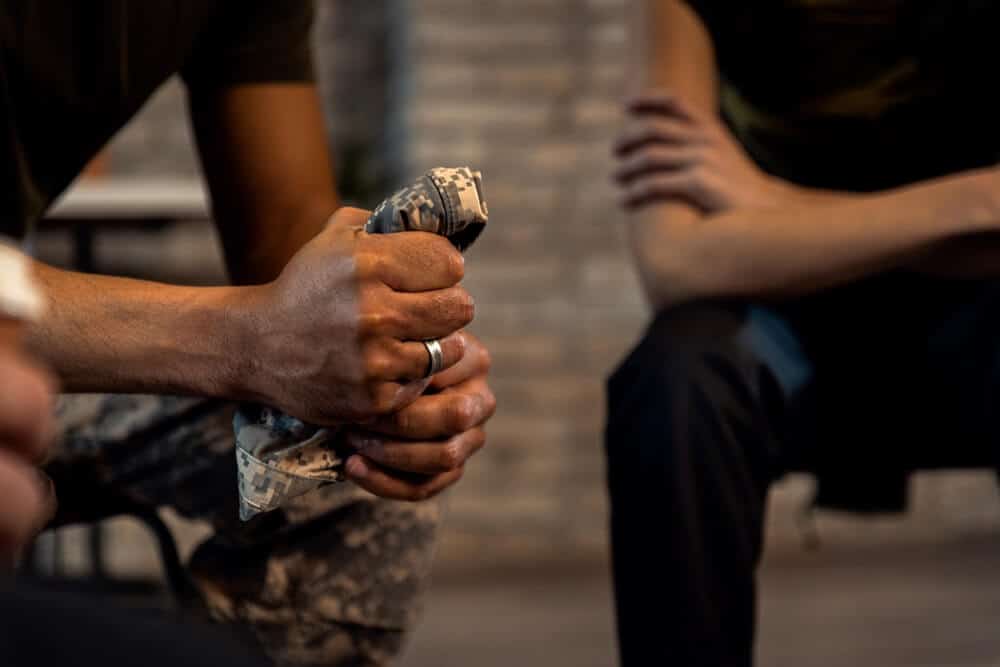One of the negative impacts of military service on Veterans is how it can lead to mental health issues, including depression. While the condition can be overcome, depression in Veterans statistics reveals a more alarming rate of how much professional treatment is needed to address the problem.
Depression among veterans is a complex condition that develops through multiple pathways and requires specialized professional intervention. The unique experiences and challenges veterans face create distinct risk factors for developing depression that differ from the general population.
The shift from military to civilian life represents a profound identity change. Many veterans struggle with a loss of purpose and structure while having difficulty translating military skills to civilian employment.
Physical injuries sustained during service often lead to chronic pain, limited mobility, or disability. These conditions are significant risk factors for developing depression, as they can limit independence and quality of life.
Veterans’ depression often presents differently than in civilians and frequently co-occurs with other conditions like PTSD or substance use disorders. Mental health professionals with experience treating veterans understand these complexities and can provide appropriate, targeted care. Let’s dive into how prevalent this issue is and what steps Veterans and their families can take to support someone dealing with depression.

How Common Is Depression Among Veterans Compared to the General Population?
Depending on the study, depression is nearly as common among Veterans and in the general population, with research from the VA revealing that 11% of Veterans reported elevated rates of depression, compared with 12.8% of non-Veterans.
However, Veterans who experienced direct combat have depression rates two to three times higher than those who didn’t see combat, creating significant differences within the Veteran population itself.
This higher prevalence creates significant challenges for veteran healthcare systems and highlights the importance of:
- Routine screening for depression in all Veteran healthcare settings
- Ensuring adequate mental health staffing and resources in VA and military healthcare systems
- Developing Veteran-specific treatment approaches that address the unique context and comorbidities common in this population
- Reducing stigma around seeking mental health treatment within the military and Veteran communities
The depression in Veterans statistics underscores why specialized mental health services for Veterans remain crucial, as both their risk factors and clinical therapy methods often differ from the general population.
Mental Health Treatment That Works
Call 949-625-0564What Are the Warning Signs of Depression in Veterans?
Depression in veterans can be displayed through several distinctive warning signs that friends, family, and healthcare providers should be alert to. They include:
Behavioral Warning Signs
- Isolation from fellow veterans or military connections
- Changes in military bearing or appearance
- Loss of interest in previously valued military accomplishments
- Increased alcohol or substance use
- High-risk behaviors
- Weapons-related concerns
Emotional and Cognitive Signs
- Combat-related guilt or shame
- Loss of purpose or direction
- Anger and irritability
- Emotional control issues
- Feelings of being a burden
- Black-and-white thinking
Physical Signs
- Unexplained physical pains
- Sleep disturbances
- Changes in energy level
- Exacerbation of service-connected physical injuries
Social Indicators
- Difficulty transitioning to civilian workplace culture
- Family relationship strain
- Comparing current situations to deployment
Veterans experiencing several of these warning signs, particularly thoughts of death or increased substance use combined with withdrawal, may require immediate professional evaluation, as these can indicate elevated suicide risk.

What Is the Impact of Untreated Depression?
Untreated depression in Veterans can have devastating consequences, often creating a cascade of worsening problems that extend well beyond mental health. These impacts are frequently more severe for Veterans due to their unique risk factors and the military cultural context:
- Compromised immune function leads to increased susceptibility to illness.
- Accelerated progression of cardiovascular disease
- Chronic inflammation is linked to numerous health conditions
- Exacerbation of chronic pain conditions is common in Veterans with service-related injuries.
- Significantly worse outcomes for traumatic brain injuries and other combat-related conditions.
- Veterans with untreated depression are three to four times more likely to die by suicide compared to non-depressed Veterans.
- Even excluding suicide, depression reduces life expectancy by 7-10 years through various physiological mechanisms.
- Difficulty maintaining civilian employment
- Underemployment relative to military skills and capabilities
- Lost productivity and earnings
- Increased disability claims and early retirement
- Marital distress and elevated divorce rates
- Parenting difficulties affecting the next generation
- Social isolation and loss of crucial support networks
- Depression is a major contributor to the disproportionate rate of homelessness among Veterans.
- Creates barriers to utilizing housing assistance programs effectively
Untreated depression in Veterans represents not only individual suffering but also a significant public health concern with far-reaching consequences. The good news is that with proper treatment and more people knowing how to help a friend with depression, many of these negative outcomes can be prevented or reversed, allowing Veterans to recover and thrive in their post-military lives.
How Can Family and Friends Support Veterans Dealing With Depression?
Family and friends play a crucial role in helping Veterans navigate depression. Your support can complement professional treatment and make a significant difference in a veteran’s recovery journey.
The best steps to lending support include:
- Create space for Veterans to share their experiences without forcing conversations.
- Avoid minimizing their feelings with statements like “everyone gets sad” or “you should be grateful you made it home.”
- Practice active listening without immediately jumping to solutions.
- Learn about military culture and the specific challenges of the Veteran’s service era.
- Understand that depression in Veterans often presents differently than in civilians—irritability and anger may be more prominent than sadness.
- Recognize that recovery isn’t linear; there will be good days and difficult days.
- Offer to help research treatment options specifically for Veterans.
- Provide practical assistance with getting to appointments.
- Gently remind about medication schedules if appropriate.
- Help identify and track mood patterns or triggers.
- Reinforce the skills they’re learning in therapy.
Supporting a Veteran with depression requires patience, understanding, and sometimes specialized knowledge. By combining your support with professional treatment, you create a powerful foundation for recovery. Remember that small, consistent acts of support often make the biggest difference over time.
Learn More About Depression in Veterans Statistics and Access Treatment at Moment of Clarity
Many Veterans face significant barriers to seeking help, including military cultural emphasis on self-reliance, concerns about career impact, or viewing mental health struggles as weakness. Professional providers with military cultural competence can help veterans overcome these barriers through understanding and respect.
Effective treatment addresses all aspects of a Veteran’s well-being—not just mental health symptoms but also physical health, social connections, spiritual needs, and practical concerns like housing and employment.
Attending professional care can coordinate these various elements of recovery.
Moment of Clarity in Southern California has specialized military mental health programs designed to help Veterans overcome depression and other ailments. Our treatments are personalized to ensure each patient receives the type of therapy best suited to their needs.
To learn more about depression in Veterans statistics and to find help, contact Moment of Clarity at 949-625-0564 today.
External Sources
- U.S. Department of Veterans Affairs – VA research on Mental Health
- Mission Roll Call – The State of Veterans’ Mental Health
- National Library of Medicine – Veteran and Military Mental Health Issues




